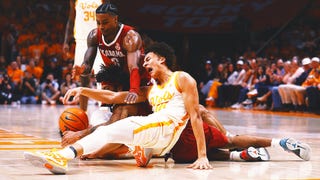TORONTO – Despite difficulties getting Toronto sports fans to warm up to the Buffalo Bills, Rogers Communications is committed to extending the team's five-year series in the city beyond 2012.
"We're there for the long haul in one way or another," Rogers vice chairman Phil Lind told The Associated Press on Friday. "We believe in this."
Lind said there have been no formal talks with the Bills, and is awaiting for "the conditions to be right" to discuss extending the series, which began in 2008. Under the deal, Rogers agreed to pay the Bills $78 million to play eight games — including five annual regular season games — in Canada's largest city and financial capital.
Lind reiterated his desire to have the Bills play additional games in Toronto, particularly if the NFL goes ahead with its proposal to expand its regular season schedule beyond 16 games. Lind then acknowledged there has been public discussion about having Toronto evenly split home games with Buffalo.
"I'm not saying whether I foresee it or not, but it's certainly possible," Lind said, referring to what he's heard from fans and read in the media. "It's certainly one of the things that is being mooted around."
But, Lind stressed, that talk is not coming from him.
"When I say splitting, I wouldn't even go near that," he said. "It could mean two and eight games. But splitting doesn't mean 50-50."
Lind is a senior Rogers executive, who spearheaded negotiating the series that put Toronto on the NFL map and made the Bills the league's first team to play annual games outside the United States.
He spoke as the Bills (0-7) prepare to play the third regular-season game of the series on Sunday, when they host Chicago (4-3) at the city's downtown Rogers Centre.
Bills officials were not available for comment and have previously declined to discuss the future of the series beyond 2012. "It's premature to go down that road," chief executive officer Russ Brandon said in August, prior to Buffalo's preseason game against Indianapolis in Toronto.
The Toronto series had been a financial windfall for the small-market Bills, who are getting nearly $10 million a game — more than double what they have been projected to make at Ralph Wilson Stadium. The series has also provided them a foothold in Canada's most populated region, which features about 5 million people.
The payoff has been mixed for Rogers in its bid to showcase Toronto, the continent's fifth-largest market, as a city capable of hosting a permanent NFL franchise.
The communications giant has been criticized for overpaying for the right to host a perennial loser — the Bills are the NFL's only remaining winless team this season, and in jeopardy of missing the playoffs for an 11th straight season. Making the Bills an even tougher sell were the high-priced tickets — averaging nearly $200 — fans were asked to pay when the series first opened.
Rogers responded by making more than 14,000 — up from about 4,700 in the first year — available at under $100 at the 54,000-seat stadium this year.
That still didn't make Sunday's game a sellout.
Bills players have noted that playing games in Toronto doesn't match the raucous atmosphere at Ralph Wilson Stadium. It doesn't help that the Rogers Center is a cavernous, domed facility where fans are far more removed from the field than at Orchard Park, N.Y.
Lind acknowledged the troubles in noting the series hasn't lived up to the high expectations company founder, the late Ted Rogers, expressed in announcing the deal in February 2008. That's when Rogers, who died the following December, envisioned full houses and fans lining up for blocks to buy tickets.
"I think that, when we first announced it, Mr. Rogers was perhaps a bit over-enthusiastic," Lind said. "That's the way he was in everything."
Overall, Lind said, "we're very happy with the series," and noted it has met the objective of establishing Toronto as a potential NFL market.
Attending NFL meetings, Lind said owners are interested in the Toronto market as a potential host for a permanent franchise.
"If you polled the owners of the teams, you would find increasingly, a realization that Toronto is one of the next moves," Lind said. "Increasing, they're all saying, 'Why not?'"
Lind said Rogers would be committed to playing a key role in luring a franchise, while understanding that NFL rules don't allow corporations to own franchises.
"Rogers would certainly play a role, whether that's putting the pieces together or actually doing it itself with the Rogers family," Lind said. "I'm uncertain at this moment, but there's no question that the people in the Rogers organization would be intimately involved in assembling a package."








































